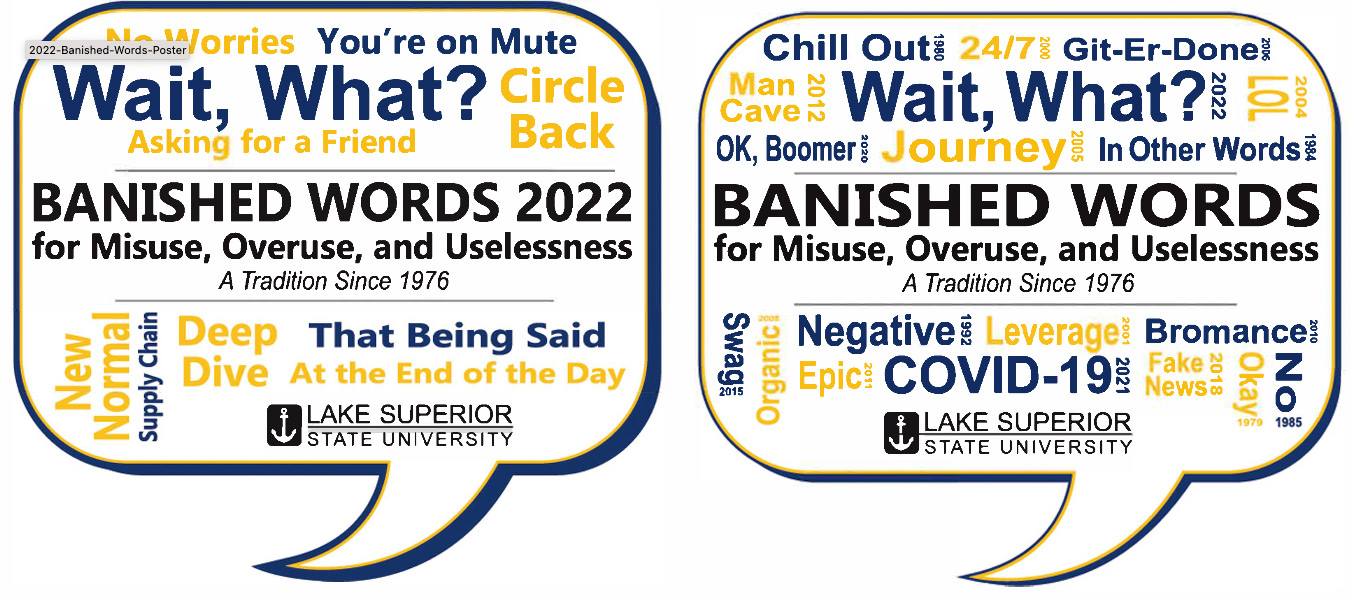
This is our sixth year presenting the lists you see on this page and the next. Now a New Year’s Eve tradition, Lake Superior State University (Michigan’s smallest public university) released its annual “List of Words Banished from the Queen’s English for Misuse, Overuse and General Uselessness” on December 31st. The tradition was started by the late W. T. Rabe, a public relations director at Lake Superior State University, on December 31, 1975. Though he and his friends created the first list from their own pet peeves about language, Rabe knew from the volume of mail he received in the following weeks that the group would have no shortage of words and phrases from which to choose. Since then, the list has consisted of nominations received from around the world throughout the year; it has been so popular among language purists that the university has kept it going. Over the decades, Lake State has received tens of thousands of nominations for the list, which now totals more than 1,000 entries.
This year, more than 1,000 of the 1,250+nominations of words and terms for banishment for misuse, overuse, and uselessness for 2022 were colloquial. In 2021, seven of the ten words and terms that LSSU banished were about corona virus (see the March-April 2021 edition of the network). This year’s list adds another three. The Banished Words List has become such a cultural phenomenon that comedian George Carlin submitted an entry that made the annals in 1994: “baddaboom, baddabing.”
“Say what you mean and mean what you say. Can’t get any easier, or harder, than that,” said Lake State President Dr. Rodney Hanley in a press release. “Every year, submitters play hard at suggesting what words and terms to banish by paying close attention to what humanity utters and writes. Taking a deep dive at the end of the day and then circling back makes perfect sense. Wait, what?”
Here is the list of the banished words and terms for 2022:
- Wait, what?
Most frequently found in text or on social media, this ubiquitous imperative question is a failed “response to a statement to express astonishment, misunderstanding, or disbelief,” explained a wordsmith. “I hate it,” added another, because the command query is an inexact method to convey the utterer’s uncertainty or surprise. “I don’t want to wait,” either, continued the second impassioned nominator.
- No worries
This phrase incorrectly substitutes for “You’re welcome” when someone says, “Thank you.” A further bungling relates to insensitivity. “If I’m not worried, I don’t want anyone telling me not to worry,” a contributor explicated. “If I am upset, I want to discuss being upset.”
- At the end of the day
After original banishment of this phrase in 1999, the day still isn’t over for this misused, overused, and useless expression. “Many times, things don’t end at the end of the day—or even the ramifications of whatever is happening,” observed a sage. Others consider “day” an imprecise measure. Today? Present times?
- That being said
Nominators cited this phrase as verbal filler, redundant justification, and pompous posturing. For instance, “however” or “but—even “that said”—does the job as a transition instead of the wordiness. “Go ahead and say what you want already!” demanded one entrant. That being said, its usefulness is certainly in doubt. As a commentator philosophized, “At the end of the day, if you will, it already has been.”
- Asking for a friend
Misuse and overuse through deceit—because the friend is a ruse. This cutesy phrase, often deployed in social media posts in a coy attempt to deter self-identification, isn’t fooling anyone. Paraphrasing one sage, “Once used to avoid embarrassment, as in, ‘Do you know a good proctologist? I’m asking for a friend.’
- Circle back
Treats colloquy like an ice-skating rink, as if we must circle back to our previous location to return to a prior subject. Opined a grammarian, “The most overused phrase in business, government, or other organization since ‘synergy’”—which we banished in 2002 as evasive blanket terminology and smarty-pants puffery.
- Deep dive
“The only time to dive into something is when entering a body of water, not going more in-depth into a particular subject or book,” admonished a petitioner. People who float the phrase aren’t near pool, lake, ocean, or sea; thus, rather than dive deeply, they flounder shallowly. An editing whiz wondered, “Do we need ‘deep’? I mean, does anyone dive into the shallow end?”
- New normal
Overused catchall for ways COVID-19 affects humankind—and banishment finalist last year. “Those clamoring for the days of old, circa 2019, use this to signal unintentionally that they haven’t come to terms with what ‘normal’ means,” a monitor elucidated. “After a couple of years, is any of this really ‘new’?” another speculated.
- You’re on mute
People switched from in-person exchanges to virtual meetings to follow the social distancing protocol of COVID-19, and the unwitting deafening silence happens on both sides of the camera. A discerning submitter encapsulated the issue: “We’re two years into remote working and visiting. It’s time for everyone to figure out where the mute button is.” Or as a quipster summarized, “Hello? Hello?”
- Supply chain
Word-watchers noticed the frequent, unfortunate appearance of this phrase toward the end of this year as the coronavirus persisted. “It’s become automatically included in reporting of consumer goods shortages or perceived shortages. In other words, a buzzword,” concluded one analyst. “Supply chain issues have become the scapegoat of everything that doesn’t happen or arrive on time and of every adverse result: overuse ad nauseam.




